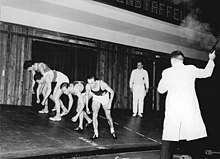Starting pistol

A starting pistol or starter pistol is a blank handgun[1] that is fired to start track and field races, as well as competitive swimming races at some meets. Starter guns "cannot fire real ammunition" without first being extensively modified: Blank shells or caps are used to prevent expelling projectiles,[1] and only a small amount of smoke can be seen when shot. In most places, trying to "modify the replica is illegal".[2]
Starting pistols may also include modified versions of standard pistols incapable of firing bullets, most commonly achieved by welding an obstruction into the barrel. This is less common nowadays, especially in Western countries. When electronic timing is used, a sensor is often affixed to the gun, which sends an electronic signal to the timing system upon firing. For deaf competitors or for modern electronic systems, a light may be used instead.

Use in races[]
The sound of the gun going off serves as the signal for the athletes to begin the event. An issue with the use of starting pistols is that, since the report of the pistol is carried to the competitors at the speed of sound, which takes about 3 milliseconds to travel one metre, positions nearest the starter hear the report a few milliseconds before further positions. This issue is exaggerated in races where the runners begin in a stagger, putting a significant distance between the nearest and furthest runners. To avoid this problem, the pistol is in all major competitions wired with a microphone that transmits the sound virtually instantaneously to loudspeakers directly behind each competitor.
With security after the September 11 attacks on the US becoming prevalent and causing issues with starting pistols,[3] a trend developed to use electronic starting systems that do not use pistols but use a "dummy" prop pistol which cannot function as a firearm and that is wired to the timing system. When the starter presses the button, they emit a signal to play a simulated gunshot that is broadcast to loudspeakers behind each lane, show a flash, emit simulated smoke[further explanation needed], and start the timing clock. Many venues have switched to the new format.[4] Beyond the security concerns, it has also been observed that even with the use of loudspeakers, some competitors still wait for the actual sound of the gun to reach them, and since the new all-electronic starting pistols have no such problems, they became the official way of starting games at the 2012 Summer Olympics.[5]

Use in American football[]
Officials in American and Canadian football formerly used a starting pistol to end each quarter of a game. In the NFL this was first done in 1924, to avoid confusion with the whistles and air horns used for other signals. The NFL discontinued the practice in 1994, by which time the stadium clock had become the official game time, rather than that kept by the officials on the field. Furthermore, upon the official end of the period, the referee will announce "That is the end of the (x period)" to the public address system.[6]
Use in the arts[]
Beside sporting events, starter pistols are also used in films and in TV or stage shows.[1]
Criminal use[]
Some pistols made to fire only blanks can be converted to fire live ammunition. Such makeshift firearms are used in crime and many are illegal to possess in certain jurisdictions.[7][8]

See also[]
- Incidents involving starting pistols
- Algiers Motel incident
- LOT Flight 165 hijacking
- Lufthansa Flight 592
- David Kang
- Discovery, Inc. 2010 Hostage Crisis
References[]
| Wikimedia Commons has media related to Starting pistols. |
- ^ a b c "Blank Guns". United States: Collector's Armoury, Ltd. Retrieved 2016-07-22.
- ^ "Blank Guns". United States: Collector's Armoury, Ltd. Retrieved 2016-07-22.
- ^ Powell, Donna (22 June 2018). "The Ancient Tradition of Starter Guns". Phillips Mini Guns - Charles Mini Works, LLC.
- ^ Wizards at Omega create space-age starter's pistol
- ^ The Speed of Sound is too Slow for Olympic Athletes, The Atlantic.
- ^ Austro, Ben (September 28, 2019). "NFL100: Why did officials use a pistol to signal the end of the quarter?". www.footballzebras.com. Football Zebras. Retrieved 31 March 2020.
- ^ Heale, John (15 October 2009). One Blood: Inside Britain's Gang Culture. New York: Simon and Schuster. p. 2004. ISBN 978-1-84983-051-5.
- ^ ATF, ed. (23 April 2013). State Laws and Published Ordinances, Firearms, 2010-2011. Government Printing Office. p. 116. ISBN 978-0-16-091510-9.
- Firearms
- Sport of athletics equipment
- Speed skating equipment
- Cycling equipment